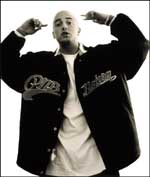
“How’s orders looking for the first week?” Eminem asks during the skit “Steve Berman” on his new album, The Marshall Mathers LP (Aftermath Entertainment/Interscope). In response, Berman, a real-life executive at Eminem’s label, warns the rapper that his album is flopping and lectures him on the commercial upside of a gangsta pose. “Do you know why Dre’s record was so successful?” he asks. “He’s rapping about big-screen TVs, blunts, 40s, and bitches. You’re rapping about homosexuals and Vicodin.”
The implied moral is that Eminem is too crazy, too outrageous, and most of all too real to be a prime-time playa in the gangsta mold. The skit is one of the funniest moments on Marshall Mathers – it mirrors the hysterical self-deprecating style of Eminem’s debut, The Slim Shady LP. But it’s an exception on a grim, sadistic album that begins with a “Public Service Announcement” voiceover warning buyers, “Little did you know, upon purchasing this album, you have just kissed his ass” and continues with a song about “blood, guts, guns, cunts, knives, lives, wives, nuns, sluts,” complete with horror-movie chain-saw sound effects. Like the album, the skit also feels dishonest: Marshall Mathers had the second-strongest first week in recent music-industry history. Eminem already makes millions rapping about homosexuals and Vicodin.
Eminem is a skilled storyteller, sometimes even a sharp cultural commentator, but he’s hardly a taboo-breaker in the tradition of the Sex Pistols or even N.W.A. For all his complaints on Marshall Mathers about the critics and censors arrayed against him, he’s never had trouble getting on MTV. (Indeed, his videos often get more airplay than those of the boy bands he spends so much of his album griping about.) On his first album, he played a gawky, picked-on white hip-hop fan growing up – and getting beaten up – in the suburbs of Detroit. With a send-up of Will Smith-style sentimentality (“Just the Two of Us”) and a wickedly observed tale of an overdose on psychedelic mushrooms (“My Fault”), Eminem showed that, besides the deranged Ol’ Dirty Bastard, he had hip-hop’s most direct connection to its dark, dirty subconscious.
Now, like the sadly delusional Axl Rose at the pinnacle of his fame, Eminem shadowboxes with nonexistent enemies, wasting his narrative skills throwing sucker-punches at vulnerable targets: women, gays, and even his own mother. (About the latter, who filed a $10 million lawsuit against her son for making statements to the media about her alleged drug use, he rhymes that “You don’t want to fuck with me / bitch you ain’t nothin’ but a slut to me.”) These days, boy bands are the easiest target of all, and Eminem gets in a cheap shot to the tune of LFO’s “Summer Girls”: “New Kids on the Block sucked a lot of dick / Boy-girl groups make me sick / And I can’t wait ‘til I catch all you faggots in public / I’ma love it.” It’s disturbing, but also just dopey: He even asks, “Am I the only one who knows that ‘N Sync stinks?” Of course not: Millions of teenage boys have already told their little sisters the same thing.
Aside from the horrifyingly detailed stalker narrative of “Stan” and the homicidal fantasy of “Kim,” nothing on Marshall Mathers rises above the level of locker-room insults – nearly every song seems to feature Eminem’s giving someone the finger. By the end of the album, Eminem has become the bullies he rapped about on his first album. On “Who Knew,” he sums up by rapping that “I make fight music for high-school kids.” Sure, but a kid like him is probably the one they’re beating up while listening to it.
In brief: detroit techno is revered for its minimalism – its productions work like well-oiled machines – but a new model called “ghetto tech” adds a combustible mix of Miami bass grooves. Perhaps sensing a moment in the making, techno godfather Juan Atkins is steering his indie label Metroplex toward a greasier vision of the future with a series of such singles. Among the best is Aaron Carl’s “Down,” full of thrusting beats and whispered promises of oral pleasure that add up to the most lascivious synth-fueled come-on since Prince’s “Erotic City.”